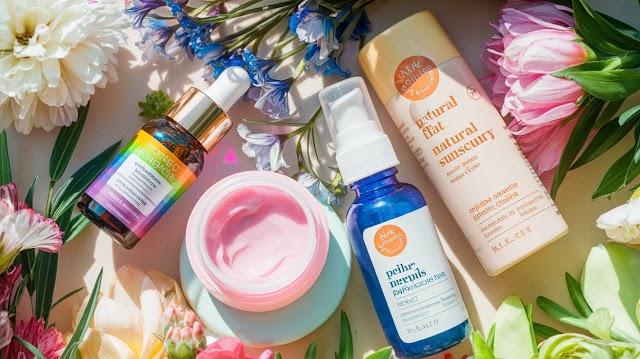 |
| Retinol Skincare Products |
What is Retinol?
Retinol, a derivative of Vitamin A, belongs to the class of compounds known as retinoids. It works by speeding up cell turnover, boosting collagen production, and clearing clogged pores. Retinol is widely used to treat various skin concerns, including aging, acne, and hyperpigmentation. Unlike harsher prescription-strength retinoids, Retinol is available over-the-counter, making it a popular choice for those looking to upgrade their skincare routine.
The Benefits of Retinol in Skincare
1. Reduces Fine Lines and Wrinkles
Retinol is highly regarded for its anti-aging properties. It stimulates collagen production, which helps to plump the skin and reduce the appearance of fine lines and wrinkles, making your skin look smoother and more youthful over time.
2. Fights Acne
Retinol helps clear acne by preventing dead skin cells from clogging pores. Its exfoliating properties also help reduce the appearance of post-acne scars and prevent future breakouts, making it a favorite for those with acne-prone skin.
3. Improves Skin Texture
By accelerating cell turnover, Retinol improves skin texture, making it smoother and more refined. It also helps fade dark spots, sun damage, and hyperpigmentation, giving the skin a more even complexion.
4. Boosts Collagen Production
Collagen is key to maintaining firm, youthful skin. Retinol promotes collagen synthesis, which helps to firm the skin, reduce sagging, and improve elasticity, making it an excellent anti-aging treatment.
5. Brightens Skin Tone
If you suffer from dull, uneven skin tone, Retinol can help. Its exfoliating properties reveal fresher, brighter skin underneath, giving your complexion a radiant glow.
How to Use Retinol in Your Skincare Routine?
Retinol can be a game-changer in your skincare routine, but it’s important to use it correctly to avoid irritation. Follow these tips for best results:
- Start Slowly: If you're new to Retinol, start with a lower concentration (0.25% or 0.5%) and use it 2-3 times a week. Gradually increase frequency as your skin builds tolerance.
- Apply at Night: Retinol makes the skin more sensitive to sunlight, so it’s best applied in the evening as part of your nighttime routine.
- Use a Pea-Sized Amount: A little Retinol goes a long way. Use a pea-sized amount and apply it evenly to your face after cleansing.
- Follow with Moisturizer: Retinol can be drying, so always follow up with a hydrating moisturizer to keep your skin moisturized and balanced.
- Pair with Sunscreen: Since Retinol can increase sun sensitivity, it’s essential to use a broad-spectrum sunscreen during the day to protect your skin from UV damage.
Common Myths About Retinol
Myth 1: Retinol Thins Your Skin
Many people believe that Retinol makes the skin thinner, but in fact, it does the opposite. By increasing cell turnover and collagen production, Retinol thickens the deeper layers of the skin, making it firmer and more resilient.
Myth 2: You Can’t Use Retinol on Sensitive Skin
While Retinol can be irritating at first, those with sensitive skin can still use it by starting with a low concentration and incorporating it gradually into their routine.
Myth 3: Retinol Causes Peeling and Redness for Everyone
It’s true that some people in experience peeling and redness when they first start using Retinol, but this is temporary as the skin adjusts. Over time, the skin builds tolerance and these side effects subside.
Types of Retinol in Skincare
There are different types of retinoids used in skincare, varying in strength:
- Retinol: The most common over-the-counter form of Vitamin A, suitable for beginners.
- Retinyl Palmitate: A milder form of Retinol, ideal for sensitive skin.
- Tretinoin: A prescription-strength retinoid that works faster than Retinol, but can be more irritating.
- Adapalene (Differin): Available over-the-counter, this retinoid is often used to treat acne.
Best Retinol Products for Every Skin Type
Looking for the best Retinol products? Here are some top-rated options to suit different skin types:
1. The Ordinary Retinol 0.5% in Squalane
A budget-friendly option that’s great for beginners, this product delivers Retinol benefits with minimal irritation, thanks to its hydrating squalane base.
2. CeraVe Skin Renewing Retinol Serum
This serum combines Retinol with ceramides and hyaluronic acid to provide anti-aging benefits while keeping the skin hydrated and protected.
3. RoC Retinol Correxion Deep Wrinkle Night Cream
A powerful anti-aging formula that visibly reduces the appearance of deep wrinkles and fine lines, making it perfect for mature skin.
4. Differin Gel 0.1% Adapalene
Originally available only by prescription, Differin is now sold over-the-counter and is excellent for treating acne without the irritation associated with stronger retinoids.
5. Paula’s Choice 1% Retinol Treatment
For those who want more potent anti-aging results, this 1% Retinol treatment is highly effective and includes soothing ingredients to minimize irritation.
Frequently Asked Questions About Retinol in Skincare
1. Can Retinol be used with Vitamin C?
While both Retinol and Vitamin C offer great skin benefits, it’s best to use them at different times of the day. Apply Vitamin C in the morning for antioxidant protection and Retinol at night for its anti-aging effects.
2. Can pregnant women use Retinol?
No, Retinol is not recommended during pregnancy or breastfeeding due to potential risks. Always consult your doctor before using any skincare products containing retinoids.
3. How long does it take to see results from Retinol?
You’ll begin to see improvements in skin texture and tone after about 4 to 6 weeks of consistent use, with more significant results appearing after 3 to 6 months.
Conclusion
Retinol is a powerful skincare ingredient that offers a wide range of benefits, from reducing fine lines and wrinkles to fighting acne and improving skin texture. Whether you're just starting out or looking to upgrade your skincare routine, Retinol can be a game-changer for your complexion. With the right products and usage tips, you can achieve smoother, younger-looking skin in no time!
Keywords: retinol, vitamin a, skincare, beauty tips, anti aging, wrinkle, retinoids






0 Comments